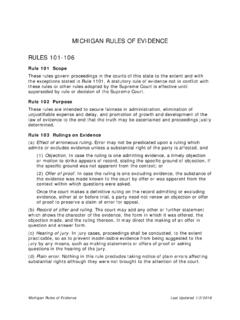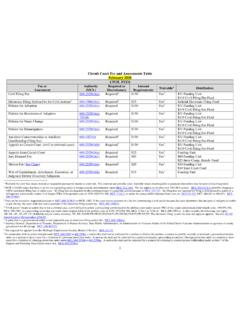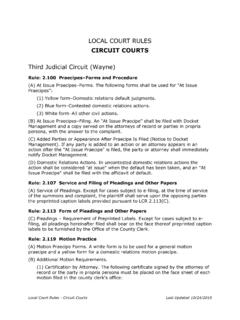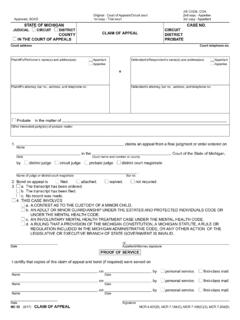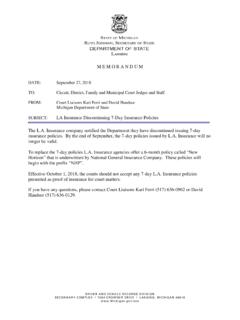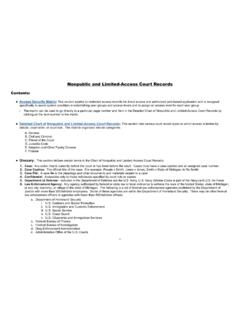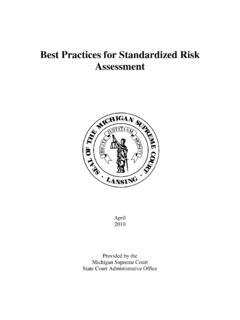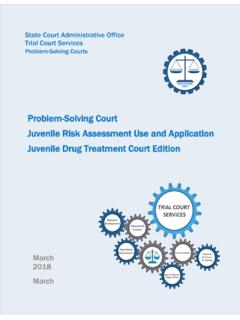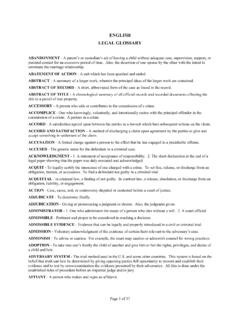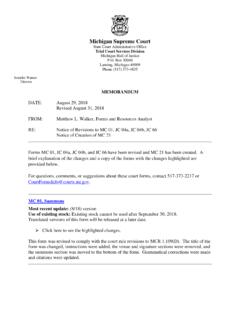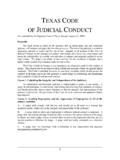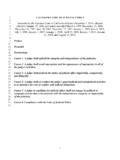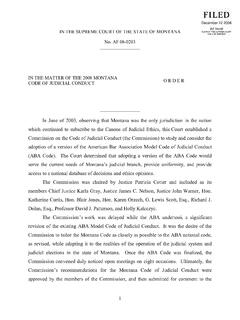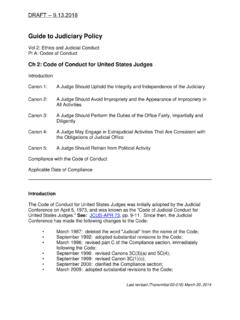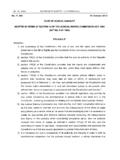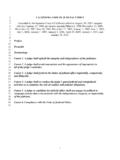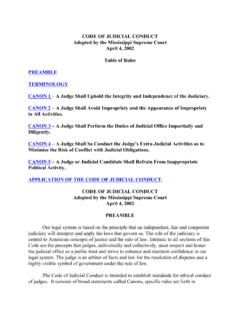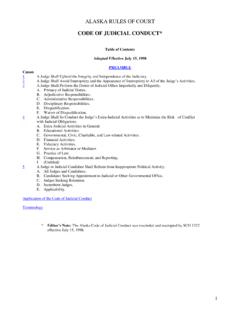Transcription of Michigan Code of Judicial Conduct - courts.michigan.gov
1 Michigan code of Judicial Conduct Last Updated 5/1/2019 Michigan code OF Judicial Conduct Canon 1 A Judge Should Uphold the Integrity and Independence of the Judiciary An independent and honorable judiciary is indispensable to justice in our society. A judge should participate in establishing, maintaining, and enforcing, and should personally observe, high standards of Conduct so that the integrity and independence of the judiciary may be preserved. A judge should always be aware that the Judicial system is for the benefit of the litigant and the public, not the judiciary. The provisions of this code should be construed and applied to further those objectives.
2 Canon 2 A Judge Should Avoid Impropriety and the Appearance of Impropriety in All Activities A. Public confidence in the judiciary is eroded by irresponsible or improper Conduct by judges. A judge must avoid all impropriety and appearance of impropriety. A judge must expect to be the subject of constant public scrutiny. A judge must therefore accept restrictions on Conduct that might be viewed as burdensome by the ordinary citizen and should do so freely and willingly. B. A judge should respect and observe the law. At all times, the Conduct and manner of a judge should promote public confidence in the integrity and impartiality of the judiciary.
3 Without regard to a person's race, gender, or other protected personal characteristic, a judge should treat every person fairly, with courtesy and respect. C. A judge should not allow family, social, or other relationships to influence Judicial Conduct or judgment. A judge should not use the prestige of office to advance personal business interests or those of others, but participation in activities allowed in Canon 4 is not a violation of this principle. D. A judge should not appear as a witness in a court proceeding unless subpoenaed. E. A judge may respond to requests for personal references. F. A judge should not allow activity as a member of an organization to cast doubt on the judge's ability to perform the function of the office in a manner consistent with the Michigan code of Judicial Conduct , the laws of this state, and the Michigan and United States Constitutions.
4 A judge should be particularly cautious with regard to membership activities that discriminate, or appear to discriminate, on the basis of race, gender, or other protected personal characteristic. Nothing in this paragraph should be interpreted to diminish a judge's right to the free exercise of religion. Michigan code of Judicial Conduct Last Updated 5/1/2019 G. No judge may accept any contribution of money, directly or indirectly, for a campaign deficit or for expenses associated with Judicial office. Requests for payment of membership dues or fees in a Judicial association do not constitute solicitation of funds for purposes of this provision.
5 Canon 3 A Judge Should Perform the Duties of Office Impartially and Diligently The Judicial duties of a judge take precedence over all other activities. Judicial duties include all the duties of office prescribed by law. In the performance of these duties, the following standards apply: A. Adjudicative Responsibilities: (1) A judge should be faithful to the law and maintain professional competence in it. A judge should be unswayed by partisan interests, public clamor, or fear of criticism. (2) A judge may require lawyers, court personnel, and litigants to be appropriately attired for court and should enforce reasonable rules of Conduct in the courtroom.
6 (3) A judge should be patient, dignified, and courteous to litigants, jurors, witnesses, lawyers, and others with whom the judge deals in an official capacity, and should require similar Conduct of lawyers, and of staff, court officials, and others subject to the judge's direction and control. (4) A judge shall not initiate, permit, or consider ex parte communications, or consider other communications made to the judge outside the presence of the parties concerning a pending or impending proceeding, except as follows: (a) A judge may allow ex parte communications for scheduling, administrative purposes, or emergencies that do not deal with substantive matters or issues on the merits, provided.
7 (i) the judge reasonably believes that no party or counsel for a party will gain a procedural or tactical advantage as a result of the ex parte communication, and (ii) the judge makes provision promptly to notify all other parties and counsel for parties of the substance of the ex parte communication and allows an opportunity to respond. (b) A judge may obtain the advice of a disinterested expert on the law applicable to a proceeding before the judge if the judge gives notice to the parties of the person consulted and the substance of the advice, and affords the parties reasonable opportunity to respond. (c) A judge may consult with court personnel whose function is to aid the judge in carrying out the judge's adjudicative responsibilities or with other judges.
8 Michigan code of Judicial Conduct Last Updated 5/1/2019 (d) A judge may, with the consent of the parties, confer separately with the parties and their lawyers in an effort to mediate or settle matters pending before the judge. (e) A judge may initiate or consider any ex parte communications when expressly authorized by law to do so. (5) A judge should dispose promptly of the business of the court. (6) A judge shall not make any public statement that might reasonably be expected to affect the outcome or impair the fairness of a matter pending or impending in any court. (7) A judge shall not, in connection with cases, controversies, or issues that are likely to come before the court, make pledges, promises, or commitments that are inconsistent with the impartial performance of the adjudicative duties of Judicial office.
9 (8) A judge shall require court staff, court officials, and others subject to the judge s direction and control to refrain from making statements that the judge would be prohibited from making by paragraphs (6) and (7). (9) Notwithstanding the restrictions in paragraph (6), a judge may make public statements in the course of official duties, may explain court procedures, and may comment on any proceeding in which the judge is a litigant in a personal capacity. (10) Subject to the requirements of paragraph (6), a judge may respond directly or through a third party to allegations in the media or other forms of communication concerning the judge s Conduct in a matter.
10 (11) A judge should prohibit broadcasting, televising, recording, or taking of photographs in or out of the courtroom during sessions of court or recesses between sessions except as authorized by the Supreme Court. (12) A judge may properly intervene in a trial of a case to promote expedition, and prevent unnecessary waste of time, or to clear up some obscurity, but the judge should bear in mind that undue interference, impatience, or participation in the examination of witnesses, or a severe attitude on the judge's part toward witnesses, especially those who are excited or terrified by the unusual circumstances of a trial, may tend to prevent the proper presentation of the cause, or the ascertainment of truth in respect thereto.
